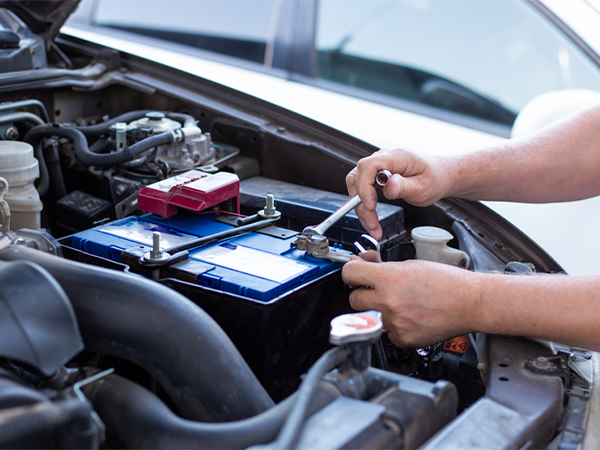What’s the Difference Between a Regular Car Battery and an AGM One?
A regular car battery uses a liquid electrolyte that’s composed of sulphuric acid and water. This severely limits the placement of the battery in your car. An Absorbed Glass Mat (AGM) battery uses a paste instead of a liquid electrolyte. This gives it a slightly reduced weight, and it will charge a bit faster than a standard one. It can also be mounted sideways and in other areas where a conventional battery cannot.
Can I Replace My Car Battery by Myself?
Most car batteries are relatively easy to replace. Keep in mind that depending on the size of the battery, they can weigh anywhere from 29 to 50lbs! If you choose to install your car battery by yourself, it’s best to have someone alongside you in case you need help. Always follow recommended safety precautions and the owner’s manual for the vehicle for specific maintenance procedures prior to replacing your battery.
How Much Do Car Batteries Weigh?
A standard normal car battery weighs anywhere from 13 to 22Kgs.
Do I Need to Add Water to My Car Battery?
The vast majority of newer car batteries are now "Maintenance-Free." This means that their cases are sealed and the vents caps are inaccessible. They are designed so that you will never have to open them up to top them off with water or acid.
Can One Car Battery Charge another Car Battery?
The short answer is NO. The long answer is that a battery by itself does not contain enough voltage to kick-start the chemical reaction needed for a depleted battery to start recharging. A standard car battery contains a 12.9 open-circuit voltage, and for the charging process to begin and move at an acceptable rate, you need at least 13.5V.
What’s the Order for JumpStart a Car?
When using your car to jump-start another vehicle, you’ll need to connect the jumper cables in a specific order to help prevent your good battery from getting damaged. Here is the correct order:
- Connect the red jumper cable to the positive terminal on the dead battery.
- Connect the other red jumper cable to the positive terminal on the good battery.
- Connect the black jumper cable to the negative terminal on the good battery.
- Finally, connect the other black jumper cable to a metal part of the car with the dead battery.
How Do I Know if My Car Battery is ready to be replaced?
You’ll need to use a load testing device or an electronic battery tester. It will clearly tell you if your battery is struggling. Alternatively, if you don’t have a testing device, you can usually take it to an auto parts store or a mechanic, and they will be able to tell you if your battery needs to be replaced.
How Long Will a Car Battery Last?
It depends on the usage of the battery and the climate you drive in. The average life for a standard lead-acid battery is anywhere from four to five years. It can be much shorter in hot climates. If you have an aftermarket stereo system, video players, or other accessories, they can shorten the lifespan of your battery as well. If you regularly drive on rough, bumpy roads the extreme vibration can wear a battery down quicker
How Do I Preserve My Car Battery if I’m Storing My Car?
If you need to put your car in storage for an extended period of time, you should disconnect the car battery. To help preserve it, you can connect the battery to a maintainer or charge the battery every two months on a regular charger.
Can I Use Car Battery for My Boat?
While you technically can, it’s strongly advised that you do not. A car battery isn’t necessarily built to withstand the rough environmental conditions found on a boat. Not to mention, you run the very real risk of the battery dying at the most inopportune time. The last thing you want is the car battery you’re using on your boat to die when you’re in the middle of a lake or out on the ocean. The only type of battery that you should use for a boat is a deep cycle or starting marine battery.
Are Maintenance-Free Batteries Really Maintenance-Free?
Yes and no. Yes, in the sense that you won’t have to perform maintenance on the battery, however, there are a few things that you should do regularly to help ensure the longevity of the battery. For starters, if you have known shorts in the electrical system of your car, get those fixed ASAP. Check the battery terminals every so often to remove any corrosion, ensure the cables are not cracking, and that the nuts haven’t come loose from the terminals.


